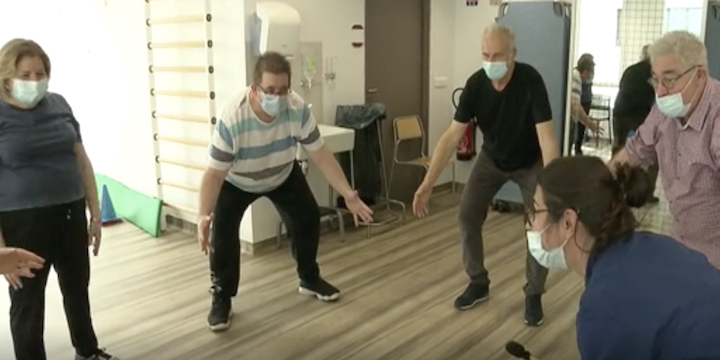Covid 19 has affected many patients and dancing and singing can help them heal better. Today, they are following a rehabilitation program because all of them have suffered from the effects of the disease. They are in the middle of a “primitive expression” session.
Eve Petit, psychomotor therapist in Lyon-Villeurbanne (69): “In primitive expression there is a full body involvement that goes in the direction of an exercise rehabilitation program. Clearly, there is also an involvement of the breath through the voice. Most of these people have difficulty. breathing and the voice that carries the breath is something that will allow them to work on breathing without thinking about it. Beyond a just physiological exercise, which they already do in physiotherapy or in other fields “.
Stéphane is 50 years old and after 15 days of hospitalization, his lungs still had traces of the disease. He was having trouble breathing, going up the stairs was really hard for him. These workshops gave it a boost.
Workshops that bring well-being
Relaxation and relaxation are the key words of this care. Hospitalization often leaves stress and anxieties that patients struggle to get rid of. Like Henriette, admitted to the clinic at the end of February.
Henriette Maman, 73 years old: “I had the English variant overnight like that and after two days they intubated me, I was in an induced coma, I woke up after the third day. It’s very hard. , morally, I am depressed, from time to time I cry. I hope that I will recover very slowly “.
By mobilizing their body, their voice and their thoughts, the primitive expression must allow these patients to be able to let go.
Eve Petit, psychomotor therapist, Lyon-Villeurbanne medipole (69): “The dance is always therapeutic, the pleasure is always therapeutic. This addition which is a specificity of the primitive expression is this voice which accompanies all the movements, all the dances, it is the little extra thing that makes people are prevented from thinking of anything else and are really all they do and are in the here and now “.
Between these walls, laughter sounds like victories. The goal is to leave behind torment, pain and dread.
Eve Petit, psychomotor therapist, Lyon-Villeurbanne medipole (69): “I think it’s a huge contrast, people who have been lying for weeks, sedated, intubated, and who are standing, singing and dancing. For me it’s still a pretty stark contrast. death in the face, I find it a nice snub to find yourself doing this therapeutic activity “.
The primitive expression leaves room for relaxation and relaxation. Most patients regain their breathing and motor skills after 6 weeks of rehabilitation.
 Cherry tomatoes contaminated with salmonella: 92 sick and 1 dead
Cherry tomatoes contaminated with salmonella: 92 sick and 1 dead  A better coaching method can make a person grow
A better coaching method can make a person grow  What is the method to prevent diabetes in children?
What is the method to prevent diabetes in children?  What are the effective factors in causing stomach ulcers?
What are the effective factors in causing stomach ulcers?  Why do embarrassing memories seem to appear at night?
Why do embarrassing memories seem to appear at night?  The amazing link between SARS-CoV-2 infection and newly started diabetes
The amazing link between SARS-CoV-2 infection and newly started diabetes  WHO says monkey pox is not a global emergency right now
WHO says monkey pox is not a global emergency right now  Single cell RNA sequencing uncovers new mechanisms of heart disease
Single cell RNA sequencing uncovers new mechanisms of heart disease  Hepatitis of unknown origin: 3 new deaths and 228 cases worldwide
Hepatitis of unknown origin: 3 new deaths and 228 cases worldwide 